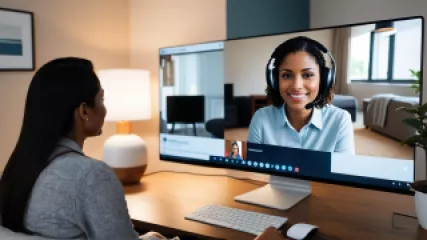Dispelling Misconceptions About Virtual Counseling for Anxiety
Anxiety is a complex and pervasive mental health issue that affects millions of people worldwide. It can manifest in various forms, such as generalized anxiety disorder, social anxiety, panic disorder, and phobias. Traditionally, seeking help for anxiety has involved face-to-face therapy sessions with a licensed psychologist or counselor. However, with the advancements in technology and the rise of virtual counseling, there are now more options available for individuals struggling with anxiety.
The Rise of Virtual Counseling
Virtual counseling, also known as web-based therapy or online counseling, has gained popularity in recent years due to its convenience and accessibility. This form of therapy allows individuals to receive professional help from the comfort of their own homes, using video conferencing platforms or secure messaging systems to communicate with their therapists.
While virtual counseling has been widely accepted for various mental health concerns, some misconceptions still exist when it comes to its effectiveness in treating anxiety. In this article, we aim to dispel these misconceptions and shed light on the benefits of virtual counseling for anxiety.
Myth: Virtual Counseling Is Less Effective Than In-Person Therapy
One common misconception about virtual counseling is that it is less effective than traditional in-person therapy. However, numerous studies have shown that virtual counseling can be just as effective, if not more so, in treating anxiety.
A study published in the Journal of Anxiety Disorders found that web-based therapy was equally as effective as face-to-face therapy in reducing symptoms of social anxiety disorder. The study involved a randomized controlled trial where participants received either in-person therapy or web-based therapy. The results showed significant improvements in both groups, with no significant differences between them.
Another study published in the Journal of Medical Internet Research compared the effectiveness of virtual reality exposure therapy (VRET) to in-person exposure therapy for individuals with specific phobias. The findings indicated that VRET was as effective as traditional therapy in reducing phobic symptoms and improving overall well-being.
These studies highlight the efficacy of virtual counseling in treating anxiety and suggest that it can be a valuable alternative to in-person therapy.
Myth: Virtual Counseling Lacks Personal Connection
Another misconception about virtual counseling is that it lacks the personal connection that comes with face-to-face interactions. While it is true that virtual counseling takes place through screens, this does not mean that the therapeutic relationship is compromised.
Therapists who provide virtual counseling are trained to establish strong therapeutic alliances and create a safe and supportive environment for their clients. They utilize various techniques to foster connection and rapport, such as active listening, empathy, and validating experiences.
In fact, some individuals may feel more comfortable opening up and expressing themselves during virtual sessions. Being in a familiar and comfortable environment can reduce feelings of anxiety or self-consciousness, allowing for a deeper level of engagement and self-disclosure.
Myth: Virtual Counseling Is Less Confidential and Secure
Privacy and confidentiality are essential aspects of any therapeutic relationship. It is understandable that individuals may have concerns about the security and confidentiality of virtual counseling sessions.
However, virtual counseling platforms prioritize client privacy and employ robust security measures to ensure confidentiality. These platforms use end-to-end encryption, comply with privacy laws and regulations, and require therapists to adhere to strict ethical guidelines regarding client confidentiality.
Before engaging in virtual counseling, it is crucial to verify that the platform and therapist you choose prioritize client privacy and follow industry best practices for data protection.
The Benefits of Virtual Counseling for Anxiety
Virtual counseling offers several benefits for individuals seeking help for anxiety:
- Convenience: Virtual counseling eliminates the need for travel and allows individuals to attend therapy sessions from the comfort of their own homes. This is particularly beneficial for those with mobility issues, busy schedules, or limited access to mental health services in their area.
- Accessibility: Virtual counseling breaks down geographical barriers and provides access to qualified therapists regardless of location. This is especially advantageous for individuals living in remote areas or countries where mental health resources may be scarce.
- Flexibility: Web-based therapy often offers flexible scheduling options, including evening and weekend appointments. This flexibility can accommodate individuals with demanding work or family responsibilities, making therapy more accessible and convenient.
- Increased Options: Virtual counseling opens up a wider range of therapists and therapeutic approaches, allowing individuals to find a professional who aligns with their specific needs and preferences. It also provides an opportunity to explore evidence-based interventions such as cognitive-behavioral therapy (CBT) or mindfulness-based techniques.
- Anonymity: Some individuals may feel more comfortable seeking help for anxiety anonymously. Virtual counseling provides a level of anonymity that can reduce stigma and encourage individuals to reach out for support without fear of judgment.
It is important to note that virtual counseling may not be suitable for everyone, and individuals should consult with a mental health professional to determine the most appropriate form of treatment for their specific needs.
"Virtual counseling has revolutionized the way we approach anxiety treatment. It offers convenience, accessibility, and effectiveness, debunking the misconceptions surrounding its efficacy. As a therapist, I have witnessed firsthand the positive impact virtual counseling can have on individuals struggling with anxiety."- Edward Wright, Licensed Psychologist
Conclusion
Virtual counseling is a valuable and effective option for individuals seeking help for anxiety. It provides accessibility, convenience, and flexibility while maintaining the quality and efficacy of traditional in-person therapy. By dispelling the misconceptions surrounding virtual counseling, we can encourage more individuals to explore this innovative approach to managing anxiety.
If you are struggling with anxiety, consider reaching out to a licensed online psychologist or counselor to see if virtual counseling is right for you. Remember, help is just a click away.






